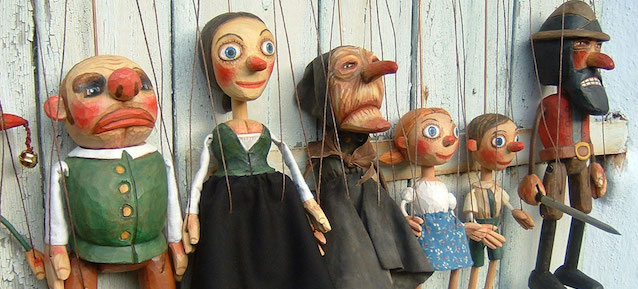
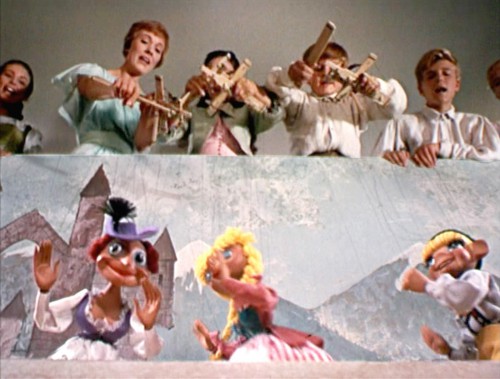
In the can’t-make-this-up department, someone commented on The Guardian’s review of John Gray’s The Soul of the Marionette: A Short Inquiry into Human Freedom:
While science is the only game in town in deepening our understanding reality, obviously, philosophers and experts in history are also pretty handy to have around.
Here is a distorted picture of British philosopher/public intellectual John Gray’s ideal of the graceful (because un-self-conscious) marionette: someone likely careening this way and that through life, with no semblance of where he’s going or what it all means. This blindness is typical of triumphalism, and we live in triumphalistic times, times when our default assumption is that our structures and, more importantly, values, are without serious flaws. We assume that liberal democracy is the final and perfected form of government that people will know, that capitalism, with modifications, will be indefinite, and that the educated among us have few moral blind spots. Moreover, science goes somehow unquestioned as the only source of legitimate, valuable information about our world.
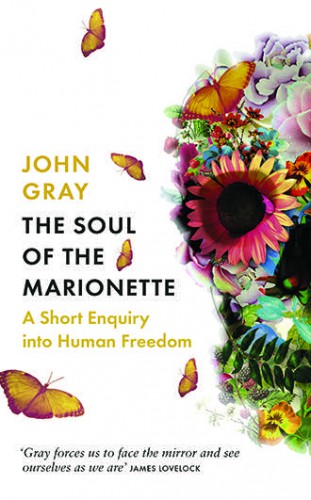 Perhaps a better word than ‘scientism’ would be ‘technichism,’ the idea that our problems are fixable by techniques, many of them offshoots of technology. The relationship here should be clear: to sell a diet pill it takes a Doctor (Oz), and to push a self-help bestseller there must be (manipulated) data and academic degrees referenced somewhere in the book. Erectile dysfunction pills or a fancy mattress will fix your marriage, the newest parenting studies will help you make your kid great, the latest dieting fad (juice cleanses!) is the key to health. These are, of course, regularly debunked, but we rarely question their underlying assumption: that science can fix matters of the heart.
Perhaps a better word than ‘scientism’ would be ‘technichism,’ the idea that our problems are fixable by techniques, many of them offshoots of technology. The relationship here should be clear: to sell a diet pill it takes a Doctor (Oz), and to push a self-help bestseller there must be (manipulated) data and academic degrees referenced somewhere in the book. Erectile dysfunction pills or a fancy mattress will fix your marriage, the newest parenting studies will help you make your kid great, the latest dieting fad (juice cleanses!) is the key to health. These are, of course, regularly debunked, but we rarely question their underlying assumption: that science can fix matters of the heart.
We know this implicitly, which is one reason why the humanities – in particular social theory – still dominate lots of media. But there’s a technichist social promise at work, too: that we may solve society’s most deeply-entrenched problems, such as race, by educating ourselves out of it. People acquire speech-codes (not ‘disabled’, but ‘differently abled’) and sometimes pass off conformity as engagement or love. The heart has been left out, and sensitivity has become a manner of mastering jargon, rather than actually being sensitive (kind of like churches where everyone’s speech is pure as the driven snow, but they’re also surprisingly mean once you get to know them).
It’s as if the world really is a theater, as Shakespeare imagined. Professionals get a raise, switch jobs, buy a boat, collect a piece of art, find a new restaurant in town, and so on. Every year is better than the one before, nicer, more interesting and charming – on the outside. But as everyone who’s ever been in a major fight with a partner, or had a kid struggle to find friends, or looked at the meager (in this country, often inverse) correlation of happiness to wealth knows, the real barometer for wellbeing is closer to how you feel on the average mundane night, without company and facing an early morning for work. Caring and being cared-for in mundane ways by those close to you, small moments of satisfaction and that baseline feeling, when at last work has been put away and there is nothing to do, of fullness or emptiness.
https://youtu.be/q6QxPkXzEQ4&w=600
The theater is fine, a nice escape, objectively (and really!) good or bad in its own way, but it is afterward, when we go home, that matters most. So you see people rejoicing in the advance of science (a good thing!), telling ourselves that capitalism is producing more material welfare than at any prior point in world-history (true, and good!), glorying in education and proper speech and manners and possessions (all good!)… but what of happiness metrics, anxiety and depression pills, mental illness, and suicide rates? A bleaker picture. To shift the analogy, it’s like a movie theater: special effects, directorial techniques, costume design, and sound mixing are better and more spectacular than ever, but there’s the same old feeling and the same old problems when we go home. Science has changed everything for the better, and nothing for the better. The Internet has made everyone a pundit (1 Tim 1:15c), given us all access to vital breakthroughs in science, allowed us to weigh in on the comments section on faraway tragedies, let us debate science and religion and, yes, diagnose cultural ills. In this focus on world-historical matters, we’re as blind as Hegel when he thought he stood at the culmination of history, and in our desperation to participate in the march of progress (personal, technical, cultural), our vocabulary for speaking of our own inner, existential, subjective lives has atrophied. Turns out philosophers may be “pretty handy,” after all.
But where to turn? Kierkegaard’s call to return to the subjective realm, expressed most strongly in his Postscript, is welcome, though not perfectly tailored to contemporary life. Many of the best Catholic thinkers are making brilliant, though convoluted, criticisms of modern thought, but few are showing a way forward. Pop philosophy and theology are often self-helpy, and academic philosophy and theology float far above the worlds of many, resplendent in empyrean abstraction. Therefore many of us, when trying to get a handle on what we 21st-century denizens are missing, must make do with John Gray.
There are reasons to be skeptical. He tends to dodge engagement with the most influential thinkers, preferring instead to engage forgotten eccentrics with esoteric thoughts – like building a theology only on the Minor Prophets. Big Ideas like ‘Gnosticism’ are employed perhaps more playfully than precisely, and communicating through a mosaic of vignettes allows him to be a little slippery. Oh, and he’s a (refreshing) atheist, so things tend to be pretty bleak, like a Bible composed only of Ecclesiastes and Lamentations. Still, he’s a voice far more credible and intelligent than, say, us, and he’s saying a lot of the same things but better, piercing through the superficial illusions of the theater – progress and agency and triumphalism – to expose the sick humanity languishing beneath.
The Soul of the Marionette is no exception, taking on the idea of free-will. Gray suggests that we are worse off than marionettes, because we tend to resist the pulling of our strings, to fight back for illusory freedom and meaning. The ways we find this are numerous, but all – to Gray’s way of thinking – share an escapist mindset:
Five centuries later, there are many who need reassurance of their significance in the world. The Aztecs and the Elizabethans looked into their mirrors to discern danger. Today those who peer into the future want only relief from anxiety. Unable to face the prospect that the cycles of war will continue, they are desperate to find a pattern of improvement in history. It is only natural that believers in reason, lacking any deeper faith and too feeble to tolerate doubt, should turn to the sorcery of numbers. Happily there are some who are ready to assist them. Just as the Elizabethan magus transcribed tables shown to him by angels, the modern scientific scryer deciphers numerical auguries of angels hidden in ourselves.
This low-level anxiety festers everywhere, a necessary counterpart to the heady combination of an age-old human drive to expand our potentials and a peculiarly modern ability to do so. Our possibilities are less circumscribed than ever before by circumstance, but alas, we’re still in thrall to our emotional limitations. One of these is an inability to cope with anxiety, a need to build a secure place for ourselves. How do we reconcile a desire for unlimited possibility with a basic need for reassurance and security? Gray provides and interesting example:
Twenty-four-hour news media generate a chronic state of low-intensity anxiety together with a tranquillizing sense of security. Shaping a perception of the world as endemically dangerous, a landscape of terror can be projected anywhere via television screens, laptops and mobile devices. This landscape frames the view of the world, while those who inhabit it are enclosed in a zone of safety. More than on any other single factor, the stability of advanced societies depends on how perceptions are shaped by the media.
This use of media is so sadly predictable that George Orwell foresaw it in the forties, because he knew the human heart that writes the script for how we live, regardless of how much we think new technologies and new possibilities have transcended the old limitations. The play of the theater surrounds us, telling us on the one hand that anything might happen at any moment, while providing us with comfortable box seats to watch the spectacle at a distance. It brings to mind Walker Percy’s disdain for the anxiety of the question, “What if the [nuclear] bomb should fall?” because the really scary question is, “What if the Bomb should not fall? What then?” In other words, how do we live real life when we no longer have the spectacles of terror and threat, progress and promise, to keep us occupied and give us meaning? As I interpret Gray’s thought here, he seems to be implying that possibility is not the same as freedom, and many of the great possibilities and spectacles in today’s theater-world serve to distract us from the personal, subjective world.
Our desire to avoid our own limitation is, paradoxically, a source of increased limitation – Augustine’s libido dominandi (lust for mastery which in fact masters us) in modern guise:
Where these older [Greek, Jewish, and Christian] moralities are superior to modern moralities is in understanding that humankind can never overcome its inherent limitations… Ancient thinkers were more intelligent as well as more honest. They knew that human action can change the world, sometimes for the good. They also knew that civilizations rise and fall; what has been gained will be lost, regained and then lost again in a cycle as natural as the seasons.
What Gray finds here could fairly be called “sin,” the idea that all is not well with us, and the progressing march of world-history, even where such progress is real, cannot improve our fundamental problems. If Gray is defeatist, it is only because he is a student of history; our modern values and new ideas cannot improve our answers to the most pressing questions any more than the values and ideas of our forebears could stave off the existential angst and atrocities of their times. Are we really so naïve to think our generation is the different one? Gray thinks we are, and it isn’t, and don’t expect him to win any popularity contests for it. One final paradox: in John Gray we have one of the most genuinely original and countercultural writers today, and he comes by it only by repeating the most self-evident truths of life.
https://youtu.be/wycjnCCgUes&w=600
___________________
I can’t help but add a Christian postscript to this short review of Gray’s thought. He diagnoses our need for myths of progress as escapist opiates, and he suggests that our inability to admit our limitations is one of the things which limits us. Perhaps there is not a compelling reason for Gray to believe the claims of Christianity, but it’s worth arguing that Christianity is one religion which dodges Gray’s diagnoses. First, Christianity does not provide much of an avenue for progress. Rather, something has been done on our behalf, and “it is finished.” Second, Christianity urges we face our limitations and failures; in other words, we think about the things we least want to think about, and we become free – still to a limited degree – by admitting our points of weakness and bondage.
Also, Gray’s marionette ideal – that we dance along without resistance, coming back down to earth and abandoning our pretensions to godhead – echoes Martin Luther almost eerily. Give up your so-called freedom, recognize someone else is pulling the strings, and un-self-consciously dance: this is not so far from Jesus or St. Paul. Perhaps it is better for Gray’s credibility within his audience that he is not a Christian. From his pessimism we have lots to learn.
He has come surprisingly close to reverse-engineering Reformational Christianity with his suggestion that we abandon our need to be gods. Yet he makes one factual error when he claims this is a modern phenomenon; it is coded into Genesis 3, by all measures an ancient text. This error gives a clue to Gray’s ambiguity: at one point he seems to be arguing against modernity, and at another, against a long-ingrained human tendency.
It’s possible Gray falls prey to a Gnosticism of his own, though admittedly more Platonic (specifically the Meno) than Manichean. To the question of how we come back down to earth, he gives no answer, leaving readers to infer that we come back down to earth by seeing how things truly are through a book like his. That does not work: as Gray well knows, the only historical theme more pervasive than human limitation is our determination to ignore it, the failure of reason to perceive it. Meaning, if anything can bring us to a truth we not only think but feel, it would have to be stronger than reason, more powerful than our myths of progress, and personal, rather than merely intellectual, since our blocks to that truth are personal. Christianity provides exactly such a mechanism, though its claims have been so watered-down, muddled by agenda, and coopted by concern for progress that it’s small wonder Gray does not go there.

COMMENTS
3 responses to “Chants of Paradise: Progress, Christianity, and The Soul of the Marionette”
Leave a Reply










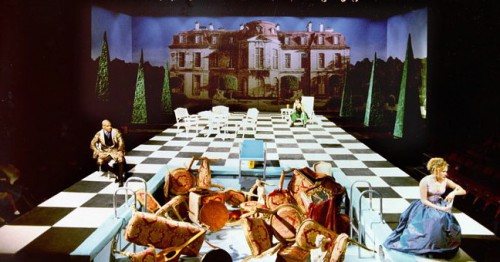
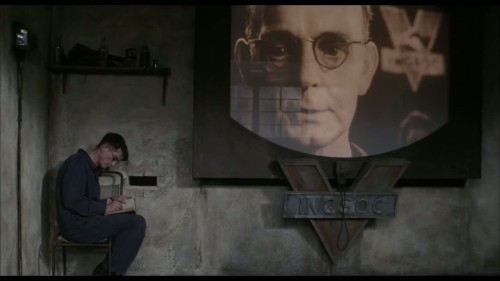




But I’d wager that while Gray demolished Human pride in our Babel projects, he will (by instinct) be hostile to the Christian vision of progress, namely Pentecost. But unlike the Babel project, be they ancient or modern (Rabshakeh sounds a lot like aggressive political propaganda and sloganeering), and as you point out, it doesn’t originate from us. But it, namely He, stands with us.
Gray’s devastating critique (and I love it, he’s great in The Silence of the Animals) levels our modern notions, but these were never Christian. In fact, unlike your positions, I’m not sure our governmental structures and economic models are good advancements. Like Rome or Athens, we live on wealth acquired through foreign blood. We are just a pansy people afraid (and quarantined by elites willing to face the dirt) of the disgusting work for our prosperity. Instead we are given the luxury of fretting about television shows, fashion, and whether we’ll have too much dip for the amount of chips we bought.
I’m not sure if you’re familiar with Jacques Ellul, but he does great work with the idea of ‘technique’. We shouldn’t abandon the advancements of science or technology and become luddites. But we need to do more than examine the motives. Sometimes the physical structures limit us. Perhaps the medium does transform the message. Technology is not inherently neutral, as it is the byproduct of ‘Technique’.
If you haven’t read him go check him out ASAP!!
Cal
PS. Though I’m not much of a fan (more of an occasional dabbler when wanting something dark), your summary and insights remind me of Tool’s song Vicarious. We love to watch bloodshed from afar because we are, as the lyric goes, “part vampire, part warrior, carnivore and voyeur”. For Tool (and Gray), this is just Human nature. For the Church, it’s damn good proof we’re sick and depraved creatures.
Another great post, thanks Will.